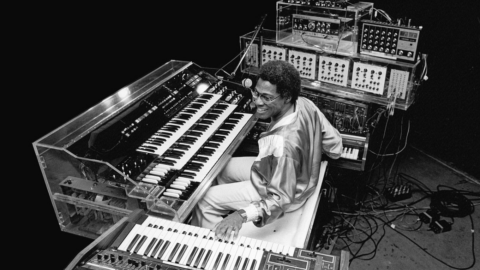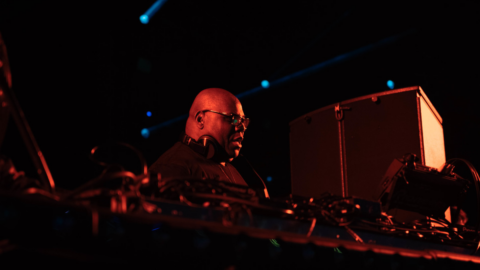Advertisement
Supported by
Send any friend a story
As a subscriber, you have 10 gift articles to give each month. Anyone can read what you share.
“I WAS lucky in that when I was 8 or 9 and might have gotten music lessons or a doll, my father gave me a soldering iron instead,” the composer Laurie Spiegel wrote in the extensive liner notes included in “The Expanding Universe,” a new anthology of the electronic works she created at Bell Laboratories from 1973 to 1977. A generous, overdue sampling of a body of work as groundbreaking as it is listenable, the album is the newest arrival in a recent wave of CDs and LPs meant to rescue from oblivion the work of pioneering female electronic composers.
Originally issued in 1980 as a single LP on Philo, a folk-music label, “The Expanding Universe” now lives up to its name, sprawling across two well-packed CDs. (A new vinyl edition sold out quickly.) Lovingly repackaged in eye-popping hues by Unseen Worlds, an intrepid reissue label operated by Tommy McCutchon, the set now includes Ms. Spiegel’s best-known piece, “Appalachian Grove,” and further selections from the same period.
Reprinted from a quirky self-interview that accompanied the 1980 LP, Ms. Spiegel’s soldering-iron recollection seems revelatory in context. In the world of avant-garde classical composition, electronic music has typically been cast as a fringe populated by outliers and eggheads: severe mathematicians with punch cards on the one hand, cosmos-divining gurus and weird-beards on the other.
Neither image suits Ms. Spiegel, who grew up playing banjo music and singing folk songs in harmony with her sister in Illinois. In New York, where she studied at the Juilliard School and Brooklyn College before taking a job as a computer programmer at Bell Laboratories in 1973, Ms. Spiegel evidently benefited from a can-do gumption fostered by the hands-on experiences of her childhood.
As in many enterprises involving technical expertise, early electronic music could be viewed as a man’s work. “Men have a way of bonding around technology,” the composer Pauline Oliveros said in an interview included in “The San Francisco Tape Music Center: 1960s Counterculture and the Avant-Garde,” an invaluable history by David W. Bernstein. “There seemed to be an invisible barrier tied to a way of treating women as helpless or hapless beings,” Ms. Oliveros said.
Ms. Spiegel recounts no such gender-based disparities in her notes for “The Expanding Universe,” in which she cites early assistance from composers like Jacob Druckman and Vincent Persichetti as well as the electronic-music pioneers Max Matthews and Morton Subotnick. Enchanted from her first encounter with a Buchla synthesizer in Mr. Subotnick’s Bleecker Street studio in 1969, Ms. Spiegel discovered a means by which to make complex sounds herself, rather than waiting for other performers to execute her written scores.
Female composers of electronic and computer music have long been overlooked outside circles of scholars and record scavengers. But because of the efforts of a handful of small, independent record labels, that situation has begun to change.
Important Records, an experimental-music label in Groveland, Mass., paved the way in 2006, starting significant reissue series devoted to works by Ms. Oliveros, and by Eliane Radigue, a French composer. (“Reverberations: Tape & Electronic Music 1961-1970,” a 12-CD set on Important devoted to Ms. Oliveros’s early innovations, is another of 2012’s banner releases.) Both remain active innovators, though neither focuses primarily on electronics anymore.
The reissue surge has also brought attention to artists either dead or no longer involved in avant-garde music. In 2007 the British label Paradigm Discs released “Oramics,” a groundbreaking anthology devoted to Daphne Oram, a composer and inventor who helped to found the influential BBC Radiophonic Workshop.
More recently “Lixiviation: Ciani/Musica Inc. 1969-1985,” an exhilarating compilation issued by Finders Keepers/B-Music last February, has renewed interest in the work of Suzanne Ciani, an Indiana-born composer whose output bridged experimental and commercial spheres, and who became a prominent New Age recording artist in the 1980s.
Arriving in the wake of those collections, “The Expanding Universe” trumps them all as a listening experience. Compared with Ms. Oliveros’s intuitive soundscapes, Ms. Radigue’s contemplative drones and Ms. Ciani’s futuristic evocations, Ms. Spiegel’s works are instantly approachable and emphatically musical.
To ears accustomed to the literally infinite array of sounds available via modern digital-sampling technology, the palette of timbres that Ms. Spiegel employed for “The Expanding Universe” can seem limited. Recall the daunting challenges involved in teaching mainframe computers to sing, though, and the range of sounds, styles and moods she covered in a relatively short period becomes considerably more striking.
Working with Groove (“Generating Real-time Operations on Voltage-Controlled Equipment”), a system devised by Mr. Matthews to control analog-synthesizer sounds with digital processes, Ms. Spiegel fashioned bubbly rhythm-oriented pieces akin to those created by Terry Riley, Steve Reich and Philip Glass, as well as oozing reveries closer in sound and spirit to latter-day ambient artists. The composition that shares its title with the album throbs and pulses for close to half an hour, a rippling drone that reveals new details and perspectives every time you listen.
Bach, Celtic tunes, African drums and the guitarist John Fahey’s maverick stylings helped to shape Ms. Spiegel’s expansive universe. And in 1977 the universe expanded to accommodate Ms. Spiegel, when Carl Sagan included one of her pieces, “Kepler’s Harmony of the Worlds,” alongside representative tracks by Beethoven and Chuck Berry on the Golden Record sent out into the cosmos on Voyagers 1 and 2 to represent humankind.
Arguably that is not the least likely place that Ms. Spiegel’s music has turned up. This year the prominent inclusion of her 1972 piece “Sediment” with a bloody battle scene in the popular film “The Hunger Games” brought Ms. Spiegel her largest audience to date.
That audience remains presumably largely unaware of Ms. Spiegel, who went on to develop Music Mouse, a composition program for Macintosh, Amiga and Atari computers, and who has quietly continued to create engrossing pieces with digital synthesis. But the reintroduction of “The Expanding Universe” should win Ms. Spiegel and her prescient oeuvre an overdue ovation from a new generation of vintage-electronics performers and admirers.
Advertisement













